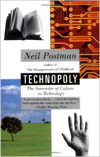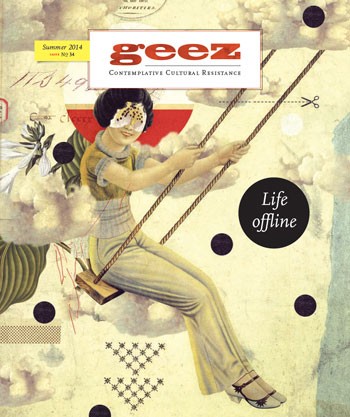Editors’ picks for futher reading
 Our culture’s obsessions with instant gratification and hyper-connectivity goes back long before the internet. In 1977, Jerry Mander wrote Four Arguments for the Elimination of Television, throwing into question the assumption that media like television are morally neutral. Neil Postman continued in that tradition with 1992’s Technopoly: The surrender of Culture to Technology. Even though Technopoly was on bookshelves six years before you could look it up on Google, it’s still one of the most lucid, accessible, and ultimately prophetic diagnoses of the Western world’s cheerful submission to technological advancement.
Our culture’s obsessions with instant gratification and hyper-connectivity goes back long before the internet. In 1977, Jerry Mander wrote Four Arguments for the Elimination of Television, throwing into question the assumption that media like television are morally neutral. Neil Postman continued in that tradition with 1992’s Technopoly: The surrender of Culture to Technology. Even though Technopoly was on bookshelves six years before you could look it up on Google, it’s still one of the most lucid, accessible, and ultimately prophetic diagnoses of the Western world’s cheerful submission to technological advancement.
 Another key thinker who has been consistent in his concern with technology through the digital revolution is Albert Borgmann, author of Crossing the Postmodern Divide (1992). His concepts of “threshold” and “device paradigm” offer ideological and philosophical frameworks for resisting life online. He’s not just a curmudgeon, though. In his words, “the radiance of reality inspires vigor and invigorates patience.”
Another key thinker who has been consistent in his concern with technology through the digital revolution is Albert Borgmann, author of Crossing the Postmodern Divide (1992). His concepts of “threshold” and “device paradigm” offer ideological and philosophical frameworks for resisting life online. He’s not just a curmudgeon, though. In his words, “the radiance of reality inspires vigor and invigorates patience.”
 In Living Into Focus (2012), Arthur Boers interprets Borgmann’s opus for a Christian readership. While Borgmann offers a framework, Boers presents a constructive, theologically grounded response to the onslaught of technology. He urges: “Rather than being perpetually available to others far away, let us choose to be present and attentive to the person nearby.”
In Living Into Focus (2012), Arthur Boers interprets Borgmann’s opus for a Christian readership. While Borgmann offers a framework, Boers presents a constructive, theologically grounded response to the onslaught of technology. He urges: “Rather than being perpetually available to others far away, let us choose to be present and attentive to the person nearby.”
 Marva Dawn does similar work in Unfettered Hope (2003), bringing critics of technology like Borgmann and Ellul into conversation with biblical scholarship. She demonstrates how technology commodifies information and leaves us dissatisfied even in affluence. Dawn offers a vision of faithful living in a technological society, while still remaining accessible for a popular audience.
Marva Dawn does similar work in Unfettered Hope (2003), bringing critics of technology like Borgmann and Ellul into conversation with biblical scholarship. She demonstrates how technology commodifies information and leaves us dissatisfied even in affluence. Dawn offers a vision of faithful living in a technological society, while still remaining accessible for a popular audience.
 Beyond the Cutting Edge? (2014) by Paul C. Heidebrecht uses the work of Mennonite theologian John Howard Yoder to suggest how the church might conscientiously engage with technology. He explicitly applies theory to the practical cases of automobiles, genetically modified foods, and the internet. He emphasizes that “technology is not merely neutral but is a moral and theological concern.”
Beyond the Cutting Edge? (2014) by Paul C. Heidebrecht uses the work of Mennonite theologian John Howard Yoder to suggest how the church might conscientiously engage with technology. He explicitly applies theory to the practical cases of automobiles, genetically modified foods, and the internet. He emphasizes that “technology is not merely neutral but is a moral and theological concern.”
 Youth ministry all too often falls prey to the subculture of consumer Christianity, but the authors of Awakening Youth Discipleship: Christian Resistance in a Consumer Culture (2008) advocate for an “inconvenient church” in a world of convenience. While not directly confronting the onslaught of digital devices, this small book is nonetheless an excellent and inherent defence against the lure of online life.
Youth ministry all too often falls prey to the subculture of consumer Christianity, but the authors of Awakening Youth Discipleship: Christian Resistance in a Consumer Culture (2008) advocate for an “inconvenient church” in a world of convenience. While not directly confronting the onslaught of digital devices, this small book is nonetheless an excellent and inherent defence against the lure of online life.
 A slew of recent books help with a critique of market-driven changes in technology. In To Save Everything, Click Here (2013), Evgeny Morozov argues that technology is always tied up with politics and warns against the quick-fix mentality he calls “technology solutionism.” Sherry Turkle’s Alone Together (2012) explains how digital communication has connected us artificially but leaves us uncomfortable with real human interaction. Douglas Rushkoff’s Present Shock (2013) observes that we’ve created the world of “continuous now,” which was the goal of the twentieth century. But the inability of our physical bodies to keep up with our digital lives throws us into a new form of anxiety: present shock. Finally, Astra Taylor’s new book, The People’s Platform (2014), squelches the argument that the internet is necessarily a democratizing force. Though it has the potential to be a positive social force, so far the online world has been a mere rearrangement of classic inequalities.
A slew of recent books help with a critique of market-driven changes in technology. In To Save Everything, Click Here (2013), Evgeny Morozov argues that technology is always tied up with politics and warns against the quick-fix mentality he calls “technology solutionism.” Sherry Turkle’s Alone Together (2012) explains how digital communication has connected us artificially but leaves us uncomfortable with real human interaction. Douglas Rushkoff’s Present Shock (2013) observes that we’ve created the world of “continuous now,” which was the goal of the twentieth century. But the inability of our physical bodies to keep up with our digital lives throws us into a new form of anxiety: present shock. Finally, Astra Taylor’s new book, The People’s Platform (2014), squelches the argument that the internet is necessarily a democratizing force. Though it has the potential to be a positive social force, so far the online world has been a mere rearrangement of classic inequalities.
In Against the Smart City (2013), Adam Greenfield questions the growing integration of technology into urban centres. Connectivity can make urban living seamless, but, as Greenfield puts it, “much of what is interesting and valuable in urban life happens precisely at the seams.” He’s in favour of technology but not state coercion. “However carefully it may be hidden – and however seductive the gleam of the surfaces hiding it – authoritarian efficiency is always founded on violence of one sort or another.”
 Identity Technologies (2014), edited by Anna Poletti and Julie Rak, is a very recent collection of scholarly essays that explores how we construct identities online and the new modes of self-expression that have arisen with social networking and perpetual wireless communication. In the words of Laurie McNeill, we’ve come to believe that “interactive representations are how we make meaning of our lives.”
Identity Technologies (2014), edited by Anna Poletti and Julie Rak, is a very recent collection of scholarly essays that explores how we construct identities online and the new modes of self-expression that have arisen with social networking and perpetual wireless communication. In the words of Laurie McNeill, we’ve come to believe that “interactive representations are how we make meaning of our lives.”
 If you’re inclined to think that life is better offline, but don’t know where to turn, perhaps start with the Buddhist classic by Thich Nhat Hanh, Being Peace (1987). With proverbial insights like “understanding means to throw away your knowledge,” this book both undermines the inexhaustible information offered by the internet and offers invaluable tools for grounding oneself in the tangible world.
If you’re inclined to think that life is better offline, but don’t know where to turn, perhaps start with the Buddhist classic by Thich Nhat Hanh, Being Peace (1987). With proverbial insights like “understanding means to throw away your knowledge,” this book both undermines the inexhaustible information offered by the internet and offers invaluable tools for grounding oneself in the tangible world.
Speaking of the tangible world, nature writing like the works of Annie Dillard and Rachel Carson use language to situate us in the world as part of an ecosystem. More recently, the Dark Mountain Project published a Manifesto and series of books that aim to come to terms with the ecological damage done by industrial civilization. As the editors describe their mission, “New stories are needed for dark times. Older ones need to be rediscovered.”
 If you’re looking for something environmentally mindful but faith-based, Sallie McFague’s Life Abundant (2001) draws on ecology, economics, and liberation theology to rethink the big questions of Christianity in greater solidarity with our planet.
If you’re looking for something environmentally mindful but faith-based, Sallie McFague’s Life Abundant (2001) draws on ecology, economics, and liberation theology to rethink the big questions of Christianity in greater solidarity with our planet.



Sorry, comments are closed.